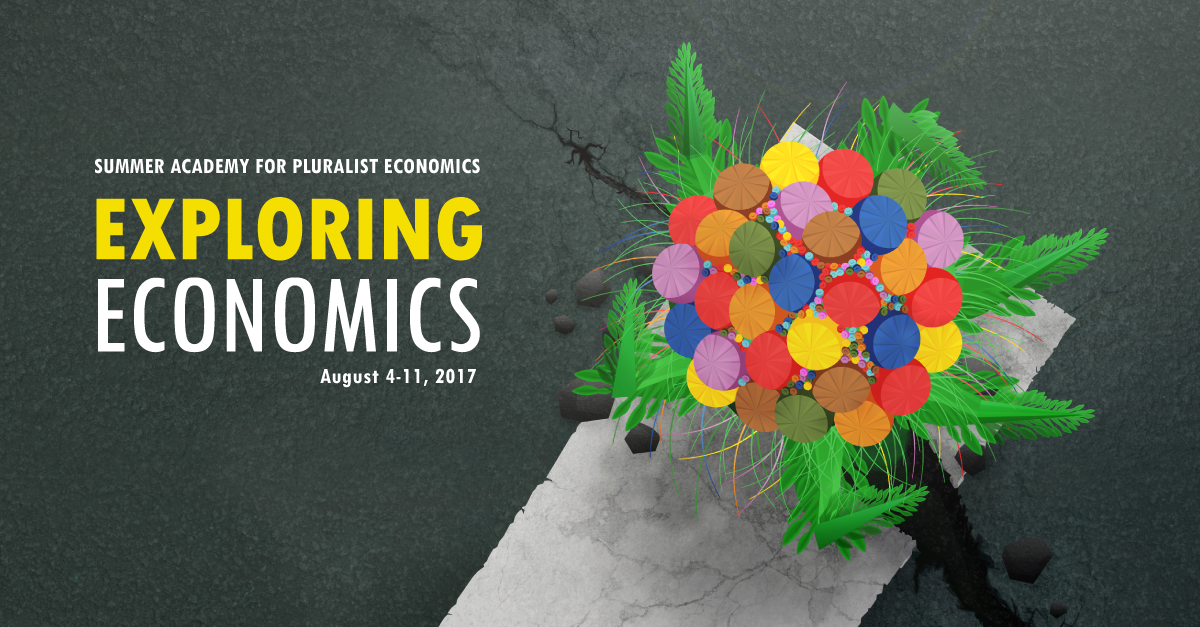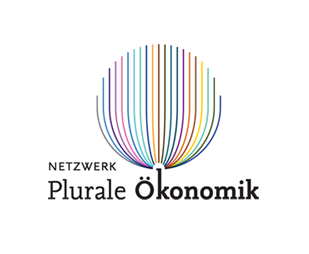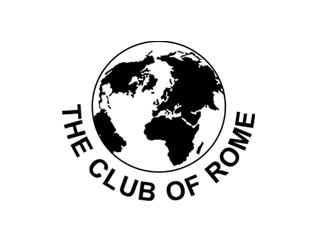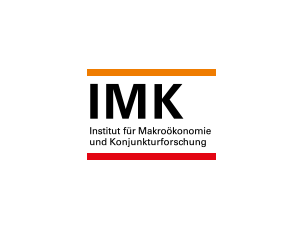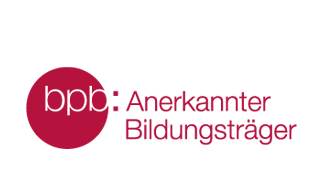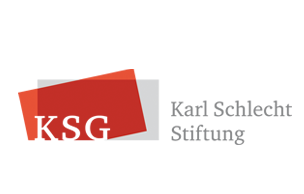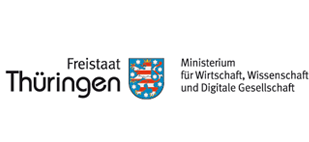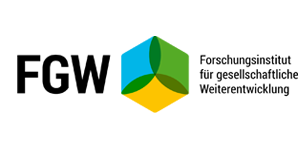Workshops
Workshop Reviews:
- Feminist Economics
- Prosperity Economics
- Philosophy of Economics (German only)
- Pluralism in Practice
- Diverse Economies & Post-Growth
- Inequality Economics
- Political Economy
- Complexity Economics
- Post-Keynesian Economics
Workshop 1: Feminist Economics
Alyssa Schneebaum (Vienna University of Economics and Business)
Language: English
In this workshop, we take a close look at what economics can learn from feminist theory and how a feminist economy differs from a mainstream economy. We start with an overview of feminist theory and explore during the week how one can apply those insights to economic research and teaching. We discuss important papers of feminist economy and brainstorm how to build upon this basis to good research and practice.
Workshop 2: Prosperity Economics
Katherine Trebeck (Oxfam Global Research)
Language: English
'Building a New Prosperity: How to Turn Vision into Practice'
Know you want to change the world, but not sure where to start?
The nature of prosperity - in all its dimensions and different approaches - is one of the fundamental questions of our time. This workshop will dive into the past, present and the future of this field and ask: What is the fundamental purpose of an economy? What is real wealth, beyond stocks and shares and house prices? What makes a good life and it is even possible to measure this? If so, who gets a say? The perspectives will range from critical understandings of different notions of prosperity to applied policy formulations. The sessions will entail a range of methods to involve participants, so you should come prepared to share your own ideas, experiences and suggestions and to listen to and work with others in developing plans.
Workshop 3: Philosophy of Economics
Elsa Egerer (University of Siegen)
Florian Rommel (Cusanus University, Bernkastel-Kues)
Ivan Boldyrev (Ruhr-University Bochum, Radboud University Nijmegen)
Language: German
We’ll analyse fundamental question of economics from a pluralist perspective: How is economics defined? What do economists analyse? Which methods do they use? Which assumptions are being made? Which relations between society and economics exist and are formed? How do different schools of thought differ in their answers to these questions and how could they be categorised? This workshops focuses on fundamental topics of economic knowledge and provides an idea of the fundamentals of the philosophy of science.
Workshop 4: Pluralism in Practice: Multiparadigmatic Economic Policy Advising
Henry Leveson-Gower (PEP - Promoting Economic Pluralism)
William Hynes (Organisation for Economic Co-operation and Development)
Language: English
The workshop focusses on exploring how a pluralist economics approach can be applied to policy. During the sessions, the participants will explore how different economic methods affect the choice of policy prescription and how to chose from different methods or combinations of such using specific policy areas to make it ‘real’ (e.g. regulation, infrastructure, industrial strategy with the environment as x-cutting theme). The workshop will also explore different analytical tools such as Agent Based Modelling to apply pluralist approaches using a range of case studies.
The workshop will be highly interactive including teams developing policy using different methods and simulations of complex systems using role play. As a result, you will have a broad understanding of the range of methods or paradigms (e.g. behavioural, institutional, complexity, feminist and ecological economics) and how these methods interact with policy approaches.
Workshop 5: Diverse Economies & Post-Growth: Exploring the hidden world of entrepreneurial diversity and its alternative take on the growth question
Jana Gebauer (Die Wirtschaft der Anderen)
Language: English
In this workshop, we will counter the dominant perception of “the company” as being large, expensive, profit-driven, and rival by disclosing the plurality of alternative economic activities. For this, we will first dive into the current wave of growth critique and learn about its theoretical, practical, and activist contributions to a social-ecological transformation. Second, we will discuss diverse economies as a research program marshalling heterogeneous economic practices to produce a more inclusive understanding of the economy. At the interface of these two issues, we will then position, discuss, and compare alternative entrepreneurial actors (such as post-growth-oriented, common good, and transition enterprises, cooperatives, social and sustainable entrepreneurs, and solidarity economy initiatives) that are rather small, non-expansive, purpose-driven, and collaborative.
Workshop 6: Inequality Economics
Sebastian Gechert (Macroeconomic Policy Institute)
Miriam Rehm (Austrian Federal Chamber of Labour Vienna)
Michael Ertl (Austrian Federal Chamber of Labour Vienna)
Language: German
The workshop aims to create a common understanding of the distribution of income and wealth in Europe and globally, including basic concepts of measurement and data sources. Participants will learn about historical and recent trends in inequality, their causes and policy implications. The workshop also covers links between distribution and macroeconomic developments.
Workshop 7: Political Economy
Anil Shah (University of Kassel)
Jannis Eicker (University of Kassel)
Language: German
This workshops deals with the relevance of Marxist Political Economy for the understanding of current crisis phenomena and consists of three parts. We start with an introduction to the scientific concepts of critical Political Economy following Marx and investigate then in the second part whether these concepts are still appropriate and useful for our reality. We focus especially on ecological and feminist critiques of Political Economy. In the third part, we analyse current developments of the global economy, e.g. the financial crisis, the crisis of the Euro area and climate change, with the acquired theoretical tools.
Workshop 8: Complexity Economics
Claudius Graebner (University of Linz)
Torsten Heinrich (University of Oxford)
Language: English
This course will cover both theoretical and methodological concepts of complexity economics. We start by discussing the history of complexity economics and its roots in different disciplines. Then we explore its meta-theoretical foundations and the relation to the philosophical concept of systemism. We will introduce the participants to basic modelling approaches of complexity economics: game theory, evolutionary dynamics, nonlinear dynamical systems, and basic network theory. When discussing the empirical aspects of complexity economics we focus on the importance of heavy-tailed distributions such as power laws, and how to work with them. Each day we spend one slot for introducing the participants to the programming language Python and the basics of agent-based modelling.
Workshop 9: Post-Keynesian Economics
Steve Keen (Kingston University, London)
John King (La Trobe University, Melbourne)
Language: English
The first half of the workshop is taught by John King, provides an in-depth introduction to Post-Keynesian Economics and is based on John King’s Advanced Introduction to Post-Keynesian Economics. It starts with an overview of the origins of Post-Keynesian Economics and how it differs from Old and New Keynesian economics. It continues with methodological issues, policy issues and comparisons with other heterodox schools. For the second half, Steve Keen will take over and focus on mathematical models of financial instability, mainly based on the Hyman Minsky’s financial instability hypothesis.

